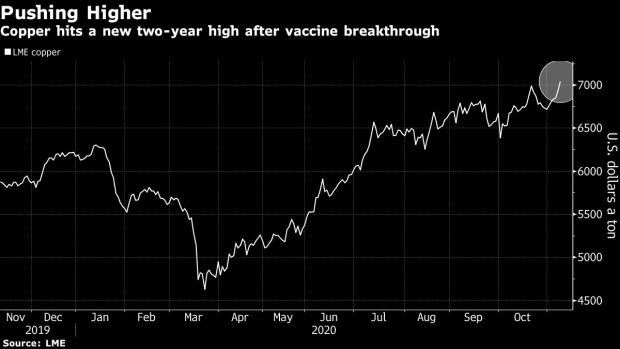Nov 9, 2020
Gold Tumbles the Most Since August After Vaccine Breakthrough
, Bloomberg News

(Bloomberg) -- Gold dropped below $1,900 an ounce in London as Pfizer Inc. said a coronavirus vaccine it’s developing prevented more than 90% of infections in a study, potentially speeding the economic recovery from the pandemic and dimming hopes for additional stimulus.
The results from the large-scale trial represent the most encouraging scientific advance so far in the battle against Covid-19, and pave the way for Pfizer and BioNtech SE to seek an emergency-use authorization from regulators if further research shows the shot is also safe.
Gold plunged as much as 4.2%, following the announcement, its biggest slide since August. Optimism that a vaccine is imminent may slow or diminish further stimulus measures to support economies ravaged by shutdowns to stem the pandemic’s spread. The precious metal has now erased all its gains since the U.S. election, when hopes for more fiscal stimulus helped prices break out of a narrow trading range.
Gold “is an asset that has been attracting investors due to an outlook for stimulus and rock-bottom low rates,” said Ole Hansen, head of commodity strategy at Saxo Bank A/S. “A potential vaccine reduces the need for economic stimulus as the economies can reopen.”
Gold slipped below its 100-day moving average, a key technical level that may have accelerated its decline.
Industrial metals, equities and oil prices all jumped, with copper hitting a two-year high. Base metals including zinc and nickel extended gains seen earlier as investors weighed potential shifts in U.S. trade and energy policy under a Biden administration. Although traders expect Trump-era policies such as steel and aluminum import tariffs won’t go away any time soon, President-elect Joe Biden may seek to de-escalate the broader trade war with China, the top industrial commodities user.
Prices:
- Spot gold fell as much as 4.2%, the most since Aug. 11, and was 3.7% lower at $1,880.22 an ounce as of 9:32 a.m. in New York.
- Copper rose as much as 1.5% to $7,052 a ton on the London Metal Exchange, surpassing a two-year high struck last month.
©2020 Bloomberg L.P.


